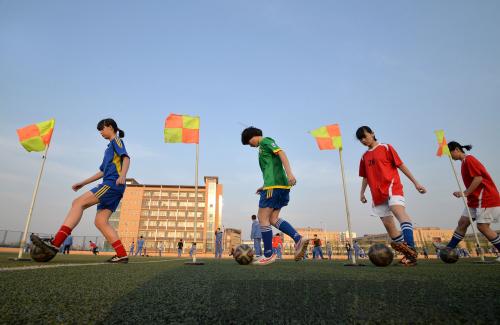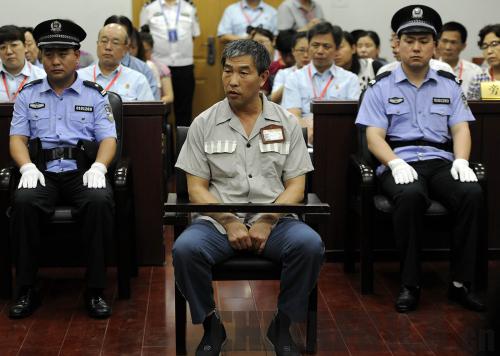| 
Women's football takes off in Hebei Province
If football fans had to select a country that could lift the FIFA World Cup trophy, few, if any, would pick China. The world's most populous country has qualified for the FIFA World Cup only once. That was back in 2002, when the Chinese team played three matches in South Korea and returned home shattered, without having scored a single goal.
However, an ambitious national plan is now in the offing to change the gloomy outlook for Chinese football. On March 16, the State Council, China's cabinet, issued the Overall Plan for Football Reform and Development, a detailed strategy covering almost every aspect of the sport – from professional clubs and leagues to national teams and grassroots football development.
In the blueprint, the mid-term goals include making the women's team world-class once more while the men's team joining the ranks of the top teams in Asia. Bidding to host the World Cup is one of the long-term goals.
The plan swung into action at the end of April with the formation of the China Football Reform Leading Group. The new entity is headed by Chinese Vice Premier Liu Yandong.
Presidential interest
"Football is one of the most popular sports in the world, but China's football level has remained low for a long time, causing discontentment among football fans," said Cai Zhenhua, President of the Chinese Football Association (CFA), explaining the background to the plan. "The state leaders also attach great importance to the national football reform."
Before the plan was made public, Chinese President Xi Jinping, an avid football fan, presided over a meeting of the central reform leading group on February 27 to discuss the development of China's football.
According to Cai, Chinese football requires long-term development to flourish, with en masse public participation, so as to grow a football culture in China.
"This is the greatest ever reform in the history of China's football development, which is really necessary," said Ma Dexing, a football commentator, in the Global Times daily. "Our task for the next step is ... to implement these measures so that China's football industry can develop according to [the] spirit of sport competition and ... market rules."

Disgraced referee Lu Jun gets a prison sentence for corruption
Litany of errors
This is not the first time that China has tried to reform its football sector. The previous reform occurred more than two decades ago. In 1992, late Chinese leader Deng Xiaoping attended a football reform meeting in Beijing, which led to the launch of China's professional football leagues two years later. In the following years, China's football developed rapidly. In 1999, the women's national team was the runner-up in the FIFA Women's World Cup, losing to the United States in a penalty shootout. In 2002, the men's team made it to the World Cup finals.
Cai says the reform to promote professional football in the early 1990s galvanized China's football development. But things went south from there, and problems emerged, including CFA leaders not understanding football development, pursuing short-term profits, unprofessional management and inadequate supervision. This led to chaos in later football development, resulting in frequent scandals such as fraud, match fixing, and betting.
Starting 2009, China took tough measures to crack down on football corruption. "After that, China's football level rose but is still lagging behind compared with many countries," added Cai. "So, the [latest] reform is necessary."
Young blood needed
One of the current mid-term goals is to encourage more people to play football.
Lack of players is a major problem. China has a population of more than 1.3 billion and yet, the number of registered football players was only about 8,000 in 2014, much less than the Netherlands'. With a small population of about 17 million, this European country boasts more than 2 million registered football players.
So the plan encourages more people, especially teenagers, to play football. The game is being promoted on campus. In late March, the People's Education Press published a football textbook for primary and middle school students, the first of its kind in China, to draw more students to football. Many cities now have compulsory football classes.
The reform plan also directs regional governments to popularize football at university and secondary and primary school levels. The goal is to raise the number of primary and middle schools famous for football from the current 5,000 to 20,000 by 2020. In 2025, the targeted figure is 50,000. In addition, China plans to have 50 million people involved in football development.
Queering the pitch
It is impossible to play football if there are no pitches or fields. In big cities like Beijing, Shanghai and Guangzhou, land is at a premium and space for those who want to play is scarce.
"I don't think it is feasible to make football compulsory in primary and middle schools," said a Beijing resident giving her name only as Liu. "There is no football pitch in the primary school where my son studies. We can't find a place for him to play football even after school."
But there will be solutions. "I think this will gradually be solved in the future urbanization process as the government has realized the problem and is trying to do something to change the situation," said Zhang Lu, a Beijing-based football commentator.
Statistics show that as of early 2014, Beijing had 295 football pitches. Though still insufficient for increasing demands, the number has grown greatly compared to the 93 pitches 10 years ago.
In Guangzhou, 33 football pitches were built last year. The city's government work report of 2015 has promised another 34 pitches across the city.
The reform plan requires governments at various levels to increase the number of football pitches and take this into account while making plans on urbanization and rural development.
"I believe things will get better and better," said Zhang.
Shedding government ties
The part of the plan that has attracted the most attention is the reform of the CFA. Unlike football associations in countries with a developed football industry, the CFA, which is also under the FIFA umbrella, is more like a government department. All its staff also work for the Football Administration Center (FAC) of the General Administration of Sport of China (GAS), and even have administrative rankings like those in government departments. The two organizations are in the same office, have the same people but different titles, and the CFA leadership is appointed by the government.
Experts say under such a system, most CFA leaders are people outside the football circle. The phenomenon is widely known as "outsiders leading insiders."
However, after the reform, the CFA will be disaffiliated from the GAS, and CFA staff will no longer have administrative rankings. It will become a financially transparent, non-governmental, non-profit organization overseeing the development of football and may have the power to reject unreasonable government interventions. Its leadership will include football professionals and representatives from the GAS, regional football associations and football leagues.
"It's good to see that the FAC will be eliminated and the CFA will be disaffiliated from the government," said Wang Qi, Secretary General of Beijing Olympic Culture Promotion Association. "This way, China's football can be developed according to market rules on the path to professionalism."
Fighting corruption
Wang says the prevailing system of the same group of people representing both the government department FAC and the non-governmental CFA is the fountainhead of serious corruption in Chinese football. "Their power should be limited; too much power may lead to corruption," he said.
Widespread corruption has seriously eroded Chinese football development, especially the corruption of the CFA. In China's largest football-related anti-corruption campaign starting 2009, former CFA chiefs Yang Yimin, Xie Yalong and Nan Yong were arrested and put under investigation over suspicions of taking bribes. In 2012, they were given 10 and a half years' imprisonment each. The campaign also led to the imprisonment of well-known referees such as Lu Jun and star players like Shen Si and Qi Hong.
Cai said the general trend is to reform all social organizations under the principles of "separating social organizations from government administrative authorities, clarifying rights and responsibilities, and managing corresponding industries according to law."
"Decoupling the CFA from the government sport administrative authority is necessary to improve China's football level and inject vitality in the football industry," he stressed.
Highlights of China's Football Reform Plan
Three-Step Goals
» Short-term goal: Streamlining the football management system;
» Mid-term goals: Professional league reaching first-class level in Asia in terms of organization and competition; men's team ranking among the leading teams in Asia; women's team returning to the world first-class level;
» Long-term goals: Successfully bidding for the FIFA World Cup tourneys; men's team playing in FIFA World Cup and Olympic Games.
Delinking CFA From State Department
» The Chinese Football Association (CFA) will be disaffiliated from the Football Administration Center of the General Administration of Sport of China to be a financially transparent, non-governmental and non-profit organization overseeing the development of football.
National Teams to Get More
China will increase its funding, incentive policies and infrastructure construction for national football teams. Two national football training bases will be built.
Fighting Graft
The mechanisms to supervise referees, coaches and players will be improved. Public security departments, procuratorates and courts should work in coordination to prevent and crack down on illegal activities in football circles.
Campus Football
» Football should be a part of physical education in primary and middle schools and the time allotted to football should be increased.
» Efforts will be made to increase the number of schools famous for football from the current 5,000 to 20,000 in 2020, and to 50,000 in 2025.
» The government will improve the insurance scheme to assist students who get injured while playing football.
More Pitches
» The plan directs governments at all levels to consider building more football pitches while making plans for urbanization and rural development.
|